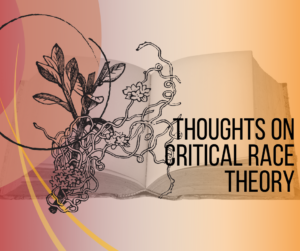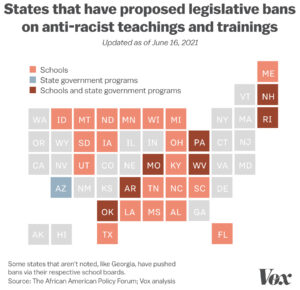Thoughts on Critical Race Theory

Talking about Critical Race Theory (CRT) can be challenging. Outside of academia, a wide array of definitions and biases exist. Perceptions become widespread and we find ourselves having a discussion that is built upon some significant misperceptions.
Consider Encyclopedia Britannica’s definition: an intellectual movement and loosely organized framework of legal analysis based on the premise that race is not a natural, biologically grounded feature of physically distinct subgroups of human beings but a socially constructed (culturally invented) category that is used to oppress and exploit people of color. And, there’s the politicized “CRT,” used as a catchall phrase that some say refers to the indoctrination of white people, aimed at making them feel shame about their role in white supremacy culture. Critical Race Theory has been a main topic on some media outlets, equipping many viewers with new language to perpetuate falsehoods and fuel anger.
The potential for shame particularly resonated with me since we believe at VISIONS that, “It’s not OK to blame, shame or attack ourselves or others.” We know through our work that shame hinders an individual’s receptivity to exploring the roots of learned racism, or any new knowledge and behavior modification. You can see this defensive behavior at school committee meetings across the country, where parents are demanding a “patriotic curriculum” over one that may incorporate more representative history. We know that a thoughtful curriculum encourages radical empathy, not shame. I personally believe that young people have massive capacity for considering difficult truths.
When opponents imply that Critical Race Theory is about penalizing children for being white, they are exploiting human’s defensiveness at being shamed. The dialogue stops being about the accurate depiction and consideration of history/race and becomes an alarmist “call to arms” against Marxism.
An important thing to note is, we know that true Critical Race Theory has not hxstorically been taught in Grades K-12. Critical Race Theory is not a curriculum. This backlash is more in response to many school districts’ efforts to create a more inclusive and representative curriculum, including more honest and objective information on how racial and ethnic inequalities have been created and sustained.
 We also know that Critical Race Theory is not synonymous with anti-racism/anti-bias “training.” However, these two have also become part of the discussion. According to analysis by The African American Policy Forum, more than two dozen states have proposed legislative bans on anti-racist teachings and trainings in schools and/or government.
We also know that Critical Race Theory is not synonymous with anti-racism/anti-bias “training.” However, these two have also become part of the discussion. According to analysis by The African American Policy Forum, more than two dozen states have proposed legislative bans on anti-racist teachings and trainings in schools and/or government.
This is concerning and reminds us that correcting the narrative is important. Christopher F. Rufo, who almost single-handedly orchestrated the anti-Critical Race Theory fervor, admits that ambiguity is the strategy.
“The goal is to have the public read something crazy in the newspaper and immediately think ‘critical race theory.’ We have decodified the term and will recodify it to annex the entire range of cultural constructions that are unpopular with Americans,” he wrote on Twitter on March 15, 2021.
The ask of our VISIONS community, to the extent you feel comfortable, is to help your friends, family, colleagues understand what Critical Race Theory is, and what it is not. At VISIONS, we believe that it’s “ok to disagree,” but rhetoric is unproductive. We’ve offered links to several articles that can help you learn more. If we move beyond disinformation campaigns, I am hopeful that we can continue to have authentic discussions about race and our many other differences, in relation to our shared hxstory and the implications it has had on all of us.I continue to feel immensely proud of the work our VISIONS community does to advance this discussion.
My very best to all of you for a restorative summer.
-Elika Dadsetan-Foley
VISIONS Executive Director
